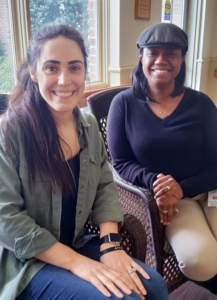Homeland Social Workers Make the Puzzle Pieces Fit
 What do social workers do? At Homeland, they help families navigate the complexities that are often involved with caregiving.
What do social workers do? At Homeland, they help families navigate the complexities that are often involved with caregiving.
“The hard work shouldn’t be on the family,” said Homeland social worker Amanda Williams. “They should just be coming to visit their loved ones. They shouldn’t have to worry about the other stuff. The hard work should be on us.”
March is Social Work Month, a time to recognize social workers and their dedication to serving as advocates to those in need. Homeland Center’s social work office is led by Director of Social Services Daniqwa Buckner and her assistant director Amanda. Together, they ensure residents and families feel at home.
Daniqwa joined Homeland in October 2020. She earned her bachelor’s degree in social work from Messiah University and her master’s from Temple University.
Amanda knew from childhood when her parents struggled to find care for her ailing grandmother that she wanted a career in social work. Originally from Souderton, she earned her bachelor’s degree from Elizabethtown College and her master’s from Marywood University.
Daniqwa and Amanda describe social workers as connectors. They meet with residents when they first come to Homeland, whether for a long-term or short-term rehab stay. Navigating the system means linking residents with people and resources inside Homeland — dietitians, therapists, unit managers, and activities. The introductions provide assurance that needs are taken care of and that there’s always someone to turn to.
Amanda is often the social worker helping residents who come to Homeland for short-term rehab stays. When they are discharged, she puts together the puzzle pieces of home health care, therapy and insurance, working longstanding connections with Homeland at Home and other providers in the community to ensure a safe and productive transition.
“Whatever comes next, we want them to have the best quality of life,” said Amanda.
Strong communication skills are essential in social work. Amanda makes it clear to families that she wants to know about a resident’s needs “in the moment” when they can be addressed quickly and efficiently.
Social workers are also detail-oriented multitaskers, attuned to subtle changes and differing needs. At Homeland, they are key team members, reviewing residents’ daily well-being. They work with assistant directors of nursing, admissions, quality assurance and activities, and therapy. Constant communication with unit managers creates a “buddy system” that keeps everything focused.
“There are multiple components to every resident,” said Daniqwa. “There’s no black and white. There are gray areas, so you have to think out of the box and be flexible to make it a full picture.”
Social Work Month, sponsored by the National Association of Social Work, is a time for recognizing the hard work of social workers and their role “beside the families, fighting the battle,” in Daniqwa’s words. They are highly educated professionals who must earn 30 credit hours of continuing education every two years to maintain licensure.
Those credits keep social workers updated on the latest research in elder care. Their knowledge of dementia and behaviors equips them to educate families about changes a loved one may experience.
In one recent case, the wife of a new resident was struggling to understand her husband’s dementia diagnosis. Daniqwa helped guide her through getting to know the new person he had become.
“We helped her understand that it’s not him, it’s the disease,” said Daniqwa. “She told us that the education we provided helped create some ease in her.”
The care social workers provide for the families of Homeland residents and patients brings comfort directly to the residents and patients.
“They’re more relaxed because their family members are relaxed,” said Amanda.


